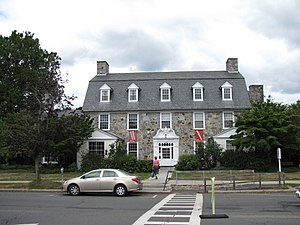Opinion: Why The Jones Library Trustees Need To “Start Over Smart”

Jones Library. Photo: wilkipedia.org

Planning for the rejuvenation of our beloved Jones Library should be a joyous community experience. We can all see that it has been sadly neglected for three decades.
On Election Day, November 2, voters will either vote “yes” for an oversized and very expensive demolition/expansion proposal based on a Jones user population of 51,000 people, or vote “no” for the generation of a more fiscally prudent, right-sized proposal, meeting the needs of its 19,000 cardholders.
The Massachusetts Board of Library Commissioners (MBLC) grant could have made a substantial contribution to a reasonably scaled project, but the Jones Library trustees got off on the wrong foot by planning a building to accommodate university and college students who rarely, if ever, use it. At 48,000 square feet, it is already the third largest in western Massachusetts, after the cities of Springfield and Pittsfield’s libraries.
The trustees also swerved way off track by developing schematic designs lacking public input and any BIPOC representation on their numerous feasibility and design committees. The few public forums held five years ago and the recent Library Chats served merely to present extensive plans already set in stone.
[The Trustees] refuse to sponsor a capital campaign or pursue any other granting opportunities for a plan other than their proposal.
The proposed plan would cost $35.3 million, requiring taxpayers to borrow $22 million, not including debt service of close to $5 million. This high price tag includes razing the entire 1993 handicapped-accessible addition, which is estimated to cost more than $7.4 million to replace. Failing to adaptively reuse this 17,800 square foot space accounts for over 20% of total project costs and would dump over 1,660 tons of highly-embodied carbon materials in landfills.
A strange but true fact, especially inappropriate in light of global efforts to combat climate change, is that the MBLC requires communities seeking their financial support to build bigger libraries. However, since they don’t stipulate how much bigger, they would grant a portion of the costs for renovating the entire building without demolition if some increase to its external dimensions was included.
A thorough refurbishment within the footprint has been estimated by Western Builders to cost approximately $15 million. This figure could cost taxpayers substantially less, but the Trustees have alerted the Council that they refuse to sponsor a capital campaign or pursue any other granting opportunities for a plan other than their proposal.
In the run up to the November 2 election, the Indy will run a series of articles to discuss specific reasons why voters should “Vote NO ‒ Start Over Smart”.
Terry S. Johnson has lived in Amherst for 40 years and served as a Mark’s Meadow teacher. She is the chair of Save Our Library, a grassroots group advocating for a prudent renovation of the beloved Jones Library.

Thank you, Terry S. Johnson, for your voice of reason.
Below is the Trustees of the Jones’ Motion to move forward with the renovation and expansion.
For those interested in comprehensive information about the project, you may find it at:
https://www.joneslibrary.org/352/Jones-Building-Project
MOTION: We, the Trustees of the Jones Library, urge Amherst residents to vote YES for the Library on November 2. Approved 6-0-0.
The proposed renovation and addition to the Jones is the outcome of a decade of careful study and planning. The proposal has been created based on the needs of, and input from, our community and endorsed by experts in library design at the state level and by town committees and the Town Council.
Voting YES is a vote for fiscal responsibility. For the same amount of money as it would cost the Town to do needed repairs, Amherst can get a modern Library that will meet the Town’s needs for decades to come. The Town’s $15.8 million share of the cost of the project, will be augmented by $20 million from other sources. Repairing the Jones will require $14-16 million just to keep the obsolete present building operational, without addressing any of its functional shortcomings, the unmet needs of the community, or the preservation of the 1928 building.
Voting YES is a vote for environmental sustainability. The expansion/renovation will make the Jones one of the most climate-friendly buildings in Amherst, eliminating the use of fossil fuels, using low-embodied carbon materials, reducing its energy use, and its total lifetime carbon emissions by 41% compared to the current building.
Voting YES is a vote for social justice and accessibility. The expansion/renovation addresses the needs of Amherst’s most disadvantaged residents by tripling the number of public computers, expanding the space available for the Library’s award-winning ESL program, simplifying the layout, and using Universal Design to make the Library more functional and accessible for all.
Voting YES is a vote for Amherst’s children, teens, and families. The expansion/renovation provides dedicated, larger, bright, safe spaces to meet the needs of all the children who want to use the Library, the teens who currently lack a space of their own, and the adults attending programs at the Library.
Voting YES is a vote for historic preservation. The expansion/renovation protects Amherst history by preserving much of the original 1928 building, reopening parts of it that are not accessible to the public today, and safeguarding the town’s priceless Special Collections.
Voting YES is a vote for Amherst’s future.
We are proud to serve the Jones and its Branches and ask for your help in insuring its future greatness.
The Jones library expansion proposal may be many things but one thing that it is not is a social justice project. Almost six months ago, I wrote an op/ed (https://www.amherstindy.org/2021/04/23/opinion-social-justice-and-the-jones-library/) calling out those who argue that spending $36 M (not including debt service and likely to be considerably more as costs estimates continue to grow during the design phase) must be a high priority of the town but are silent about spending money where the need is greatest. This ongoing claim that the library is social justice work because of a small charitable component contained within the overall project and without any effort to address or acknowledge the considerable injustice that lurks within our midst, is cynical and offensive. I suggest that the critique is even more germane today. Here is the concluding paragraph.
Many of us who are critical of the Jones expansion as proposed, welcome an improved library. But we see other needs in the town that are not being met and a more modest Jones project might have freed up some money to address the circumstances of those most in need as well as the structural conditions that create that need. I would like to hear the same kind of advocacy for spending on justice as I hear for the Jones expansion and I would like to see a commitment from our government to spend money where the need is greatest. But that’s not what I see nor what I hear. To justify extravagant spending as social justice, gives folks permission to ignore the pressing needs that remain unmet, and to say we’ve spent wisely, and to say we’ve done the best we can. And that is intolerable.
As a town, we can spend 15 million to update the HVAC, plumbing, and accessibility of the Jones – all of which are desperately needed. Or, we can spend 15 million as a town to do all of that plus accept state funding to improve the functionality of the space to meet the needs of more people in Amherst and take the building off fossil fuels. The state is simply not going to pay for us to only do the bare minimum upgrades – they want to see improvements in the capability of the building to provide for our community. That is how state grants work, and our taxes go to funding those programs. Is everyone in town going to agree on every programming improvement? Of course not. But I really struggle to understand why personally feeling like these improvements are not needed is a reason to reject the entire project. Because let’s be clear – if we say no to the matching funding we are NOT going to fund the 15 Million to do the bare minimum, which means we will subject our community and our library staff to many more years working in a run-down and potentially unsafe environment that is not accessible. We will be burdening future Amherst taxpayers with upgrades, all while continuing to burn natural gas in an inefficient space. Voting yes is NOT fiscally conservative – it is pushing the burden off to a future generation while letting our state tax money go to build new libraries in other towns.